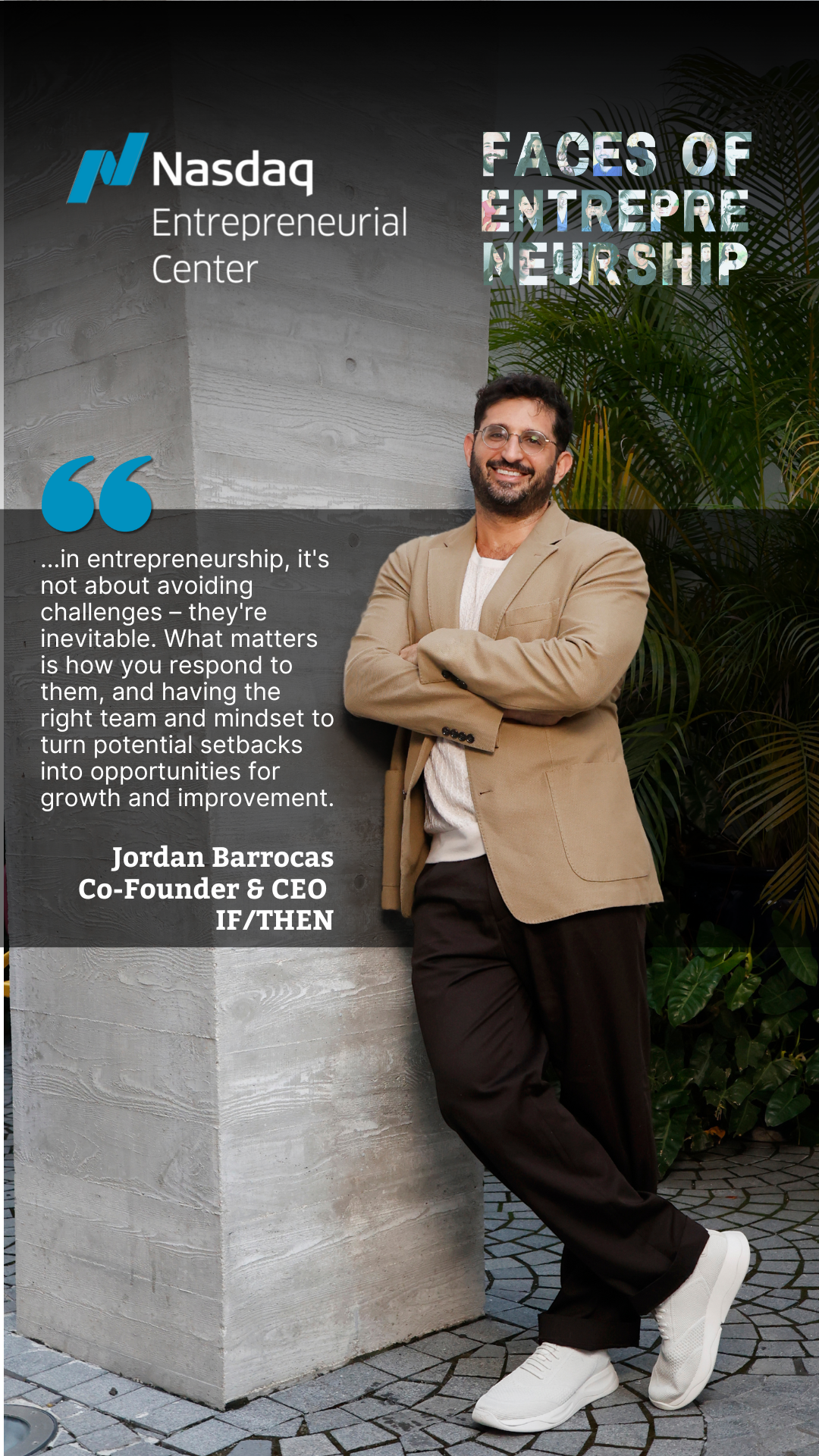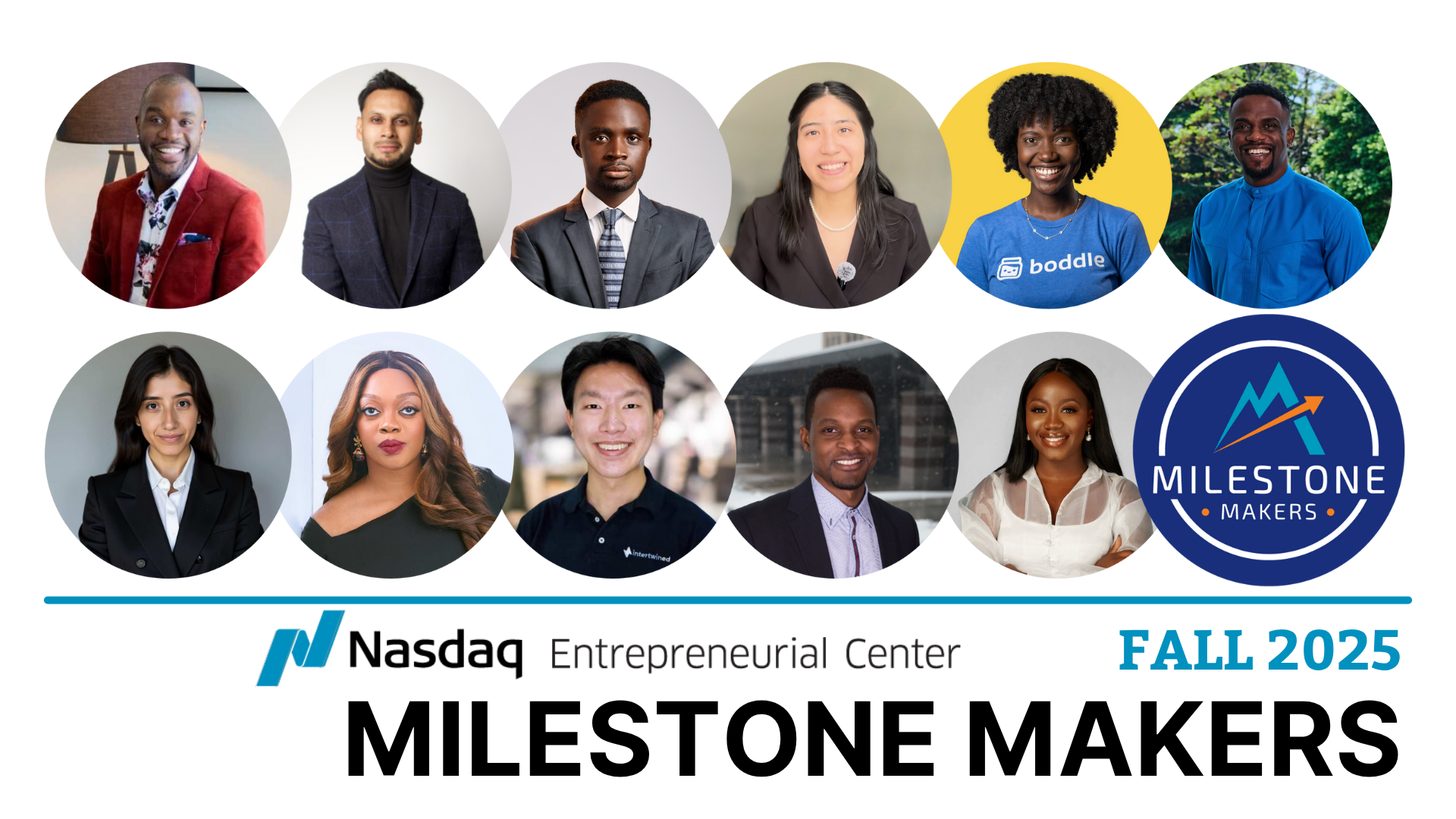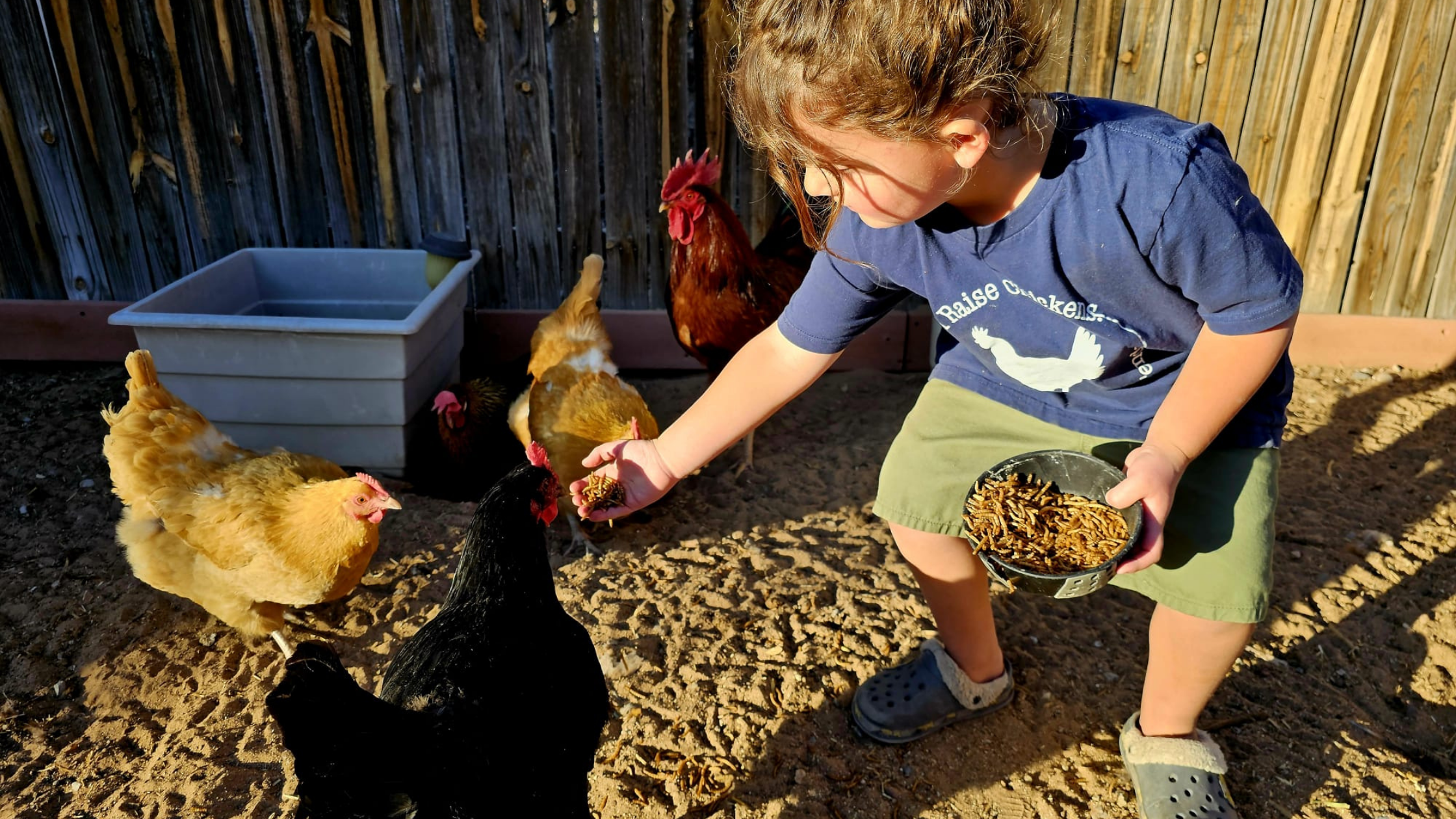Jordan Barrocas is no stranger to the entrepreneurial journey. From his early days of selling snacks to his neighbors to successfully pitching Three Jerks Jerky on Shark Tank, Jordan has always been driven by a passion for creating products that add value to people’s lives. As a third-generation shoemaker, his latest venture, IF/THEN, marries tradition with innovation by focusing on the perfect trifecta of comfort, versatility, and style in footwear.
Inspired by his own search for a truly all-day shoe, Jordan set out to create a brand that could meet the diverse demands of modern life. Guided by his personal values of honesty, hard work, and leading by example, he and his team are reimagining what it means to walk through life comfortably. For Jordan, success is about more than building a thriving business—it’s about sparking a movement toward comfort and well-being, one step at a time.
In this Faces of Entrepreneurship profile, Jordan shares insights into his entrepreneurial mindset, the lessons he’s carried forward from past ventures, and how IF/THEN is paving the way for a more comfortable future.
What does “entrepreneurship” mean to you?
Jordan Barrocas: Entrepreneurship isn’t just a profession; it’s a characteristic, a way certain people are wired. To me, it’s about having the ability to take ideas and bring them to life. Entrepreneurs have a unique perspective on risk – we see it as an opportunity rather than something negative. It’s this mindset that allows us to innovate and create value where others might only see obstacles. Entrepreneurship is about having the vision to spot opportunities and the drive to turn them into reality, often in the face of uncertainty and challenges.
 Tell us about your first experience with entrepreneurship.
Tell us about your first experience with entrepreneurship.
JB: Entrepreneurship has been a part of my life for as long as I can remember. As a kid, I was always setting up some kind of makeshift business in front of my parents’ house, selling whatever I could get my hands on. Growing up in a family that owned a shoe factory, I was exposed to the world of business from a young age, which really sparked my interest in how businesses create value. My first serious venture into entrepreneurship was launching Three Jerks Jerky, a filet mignon beef jerky company. This experience was a crash course in building a consumer brand, including an appearance on Shark Tank where we successfully negotiated a deal with Daymond John. That journey taught me invaluable lessons about partnership, brand building, marketing, and scaling a business – all of which I’m now applying to my current focus: making shoes and scaling IF/THEN.
What is your company’s origin story? What is the biggest reason you started your business? What did those early days look like and teach you?
JB: As a third-generation shoemaker, footwear is in my blood. I’ve been in the business of making millions of pairs of shoes a year for other people, but I’ve always dreamed of starting my own brand. The spark for IF/THEN came about two years ago when I was searching for a shoe that I could wear all day long, for everything I do. When I realized it didn’t exist, I decided to make it myself. The biggest reason for starting IF/THEN was to fill this gap in the market – to create a truly versatile, all-day shoe that could keep up with the diverse demands of modern life. Those early days were a whirlwind of design iterations, material testing, and market research. They taught me the importance of staying true to our vision while remaining flexible enough to adapt based on what markets are telling us.
What do you wish you knew when you started? Is there anything you would do differently?
JB: I’m fortunate that this isn’t my first startup, so I’ve been able to apply lessons from past experiences – including failures – to IF/THEN. Two crucial insights stand out:
- The importance of finding great partners who are cultural fits with both me and the company we’re building. This alignment has been instrumental in our ability to work cohesively and make decisions efficiently.
- Building optionality and flexibility into the company from day one. Both in terms of our partnership structure and operations, we’ve taken an iterative approach that allows us to adjust as needed. In a startup, things need to move quickly, and this flexibility has been key to our ability to pivot and evolve.
What does “success” look like for you? We’d love to hear your biggest, boldest dream. What do you think will help you achieve it?
JB: Success, for me, is about creating products – starting with shoes, of course – that make the world a more comfortable place. That’s the primary vision driving IF/THEN. While we know this approach will build a business that creates significant value, true success will come from the gratification of seeing our vision realized. My boldest dream is to see IF/THEN not just as a shoe brand, but as a catalyst for a broader movement towards comfort and well-being in various aspects of life. I envision a future where our approach to comfort influences not just what people wear on their feet, but how they think about comfort in general life. To achieve this, I believe we need to stay true to our core mission while remaining open to innovation and collaboration. It’s about consistently delivering on our promise of comfort and versatility, building a strong community around our brand, and always being willing to push the boundaries of what’s possible in footwear and beyond.
What is your superpower as an entrepreneur? What is your proudest and darkest moment so far?
JB: To be honest, I don’t believe I have a superpower. There are so many entrepreneurs who excel in various areas far beyond my capabilities. If anything, my strength lies in the strong work ethic I’ve developed to keep pace with the superstars around me. I don’t give up on things I set my mind to – perhaps to a fault sometimes – and I always strive to communicate as honestly as I can. While I may fall short at times, I know that in the long run, this persistence and honesty will get me where I need to be. As for highs and lows, launching IF/THEN and seeing our first shoe, The Callisto, resonate so strongly with customers has been a significant high. A notable low was the failure of my beef jerky company, Three Jerks Jerky.
What are your personal driving principles, your top values?
JB: My top values are honesty, work ethic, and leading by example. These principles guide everything I do, both in my personal life and in business. I believe that being truthful, putting in the hard work, and demonstrating the behavior you expect from others are fundamental to building trust and achieving long-term success.
These values have been instrumental in shaping IF/THEN’s core principles. We firmly believe that “culture eats strategy for breakfast,” and our company culture is a direct reflection of these values. For instance, our commitment to honesty translates into transparent communication with our team and customers. Our strong work ethic drives our relentless pursuit of product perfection and customer satisfaction. And by leading by example, we’ve created an environment where everyone, from the leadership team to new hires, is expected to embody these values. This approach influences who thrives in our team and how we run our business. We look for these values in potential hires and partners, ensuring that everyone who joins IF/THEN is aligned with our core principles.
What’s it like to work alone or with your partners?
JB: I love working with my partners. I have two co-founders who bring more wisdom and experience to the table than I do. They’re not just business partners but role models in both business and life. I try to maximize my time with them, constantly learning and growing from their insights and approaches. Their diverse perspectives and complementary skills have been crucial in navigating the challenges of building IF/THEN.
Have you raised outside capital thus far?
JB: Our first round was a friends and family round. Currently, we’re preparing for our seed stage raise. We chose this route because in the early stages of a company, these are the people who know us best and truly understand our vision. These early investors have the most faith in what we’re building, and their support provides a strong foundation for future fundraising efforts.
How long have you been in the fundraising process?
JB: Our friends and family round moved quickly – we closed it in about six weeks. As we gear up for our seed round, we anticipate it might take longer to close, but we’re optimistic. With the traction we’ve gained and the preparations we’re making, we’re hopeful for another relatively quick round. We’re working hard to prepare in advance and run a tight, efficient process to make the most of investor interest and minimize disruption to our business operations.
Where do you meet investors?
JB: For our initial round, most investors came from our personal networks. As we move forward with our seed round, we’re shifting our focus to family offices and venture investors. We’re developing a strategic process to identify potential investors who could add the most value to IF/THEN, beyond just capital, and finding the best ways to approach them.
How has your network helped you raise capital?
JB: Our network was critical for our first round – it was our primary focus and source of investment. Looking ahead to our seed round, our network will continue to play a crucial role. We plan to leverage our connections as a starting point to reach our target investors, using warm introductions wherever possible to open doors and build credibility.
What role does mentorship play in your world (as a mentor or mentee)? Tell us about what makes mentorship valuable to you and your business.
JB: While I’ve heard amazing stories about how mentors have helped entrepreneurs in countless ways, I haven’t yet had the opportunity to find a formal mentor that’s the right fit for me. However, I do rely heavily on coaches to help keep me at my best. I’ve found that I need to focus on exercise and nutrition to operate at full speed, and having coaches and groups in these areas has been tremendously helpful in keeping me accountable. This type of guidance, while not traditional business mentorship, plays a crucial role in maintaining my overall performance and well-being, which directly impacts my effectiveness as an entrepreneur. In the future, I’m open to finding a business mentor who aligns with my values and can provide valuable insights as IF/THEN continues to grow. For now, the combination of my partners’ guidance and my personal coaches provides a strong support system for both personal and professional growth.
Can you share some insights into the market or industry you operate in? How have you navigated challenges and changes in the market landscape?
JB: The footwear industry is incredibly challenging and complex. While it’s a huge market, it’s dominated by a few key players. The supply chain is intricate, and the product requires a lot of specialized knowledge. Fortunately, our team brings extensive experience on the supply and product side of the industry.
One of the biggest shifts we’re seeing is the massive push to move manufacturing bases out of China to alternative countries. We’ve built flexibility and optionality into our business model from day one, which uniquely positions us to take advantage of this changing landscape. By maintaining a nimble approach to our supply chain, we can adapt quickly to industry trends and challenges, ensuring we’re always delivering the best product to our customers.
Many entrepreneurs continue to perfect their daily routines to support their work and greater vision; would you mind sharing your morning routine or a regular ritual that grounds your work each day?
JB: I’m actually in the process of overhauling my morning routine. My old routine was setting me up for failure: I’d wake up, immediately check my weight (and get frustrated), then grab my phone to respond to overseas messages before Asia’s workday ended. By the time I left my bedroom, I was already stressed and irritated. Now, I’m implementing a new approach. I keep my phone in the kitchen overnight to avoid the temptation of checking it first thing. I only weigh myself on Mondays. Instead, I start my day with journaling or a positive mantra, followed by 15 minutes of quality time with my kids before I look at my phone. I’m only three days in, but it’s already making a significant difference in setting a positive tone for the day and avoiding that negative feedback loop.
How do you manage the work-life balance as an entrepreneur? What strategies have you found effective in maintaining your well-being?
JB: I’ll be honest – I’m still struggling with this balance. Running two companies while having two young kids at home is incredibly challenging. I’m constantly trying to figure out how to devote enough attention to both my businesses and my family. The strategy I’m currently working on – and I emphasize ‘working on’ because I’m not great at it yet – is saying ‘no’ more often to avoid overextension. I’ve also noticed that when I prioritize self-care, I’m better at everything else. Giving myself time to exercise daily and focus on my own needs, even if just for a short while, makes me more present, less stressed, and more effective in both my professional and personal life.
Where do you turn for inspiration?
JB: For big picture inspiration, I think about my family’s journey. They left Cuba in 1960 as refugees and were able to create a true American Dream story. Reflecting on what they built from nothing really motivates me to create and push forward. Their resilience and success remind me of what’s possible with determination and hard work.
Building and sustaining a business often involves overcoming various challenges. Can you share a specific moment where your entrepreneurial resilience was tested, and how did you navigate through it to ensure the sustainability of your business? What lessons did you learn from that experience?
JB: Launching IF/THEN has certainly come with its share of challenges. One significant test of our resilience came early on when our fourth partner, who was slated to be the CEO and had a significant operational role, decided to step away from the business. This could have been a major setback, potentially even threatening the viability of our business. However, it ultimately became an opportunity for growth and improvement. We rallied together as a team, completely rethinking our strategy and bringing in a new partner for our growth marketing.
The key lessons from this experience were the importance of flexibility and strong partnerships. The remaining partners were all deeply aligned in our vision and values, which allowed us to navigate this challenge effectively. By maintaining a flexible approach, we were able to pivot quickly and emerge from this challenge in a much stronger position than we might have been otherwise.
This experience reinforced for me that in entrepreneurship, it’s not about avoiding challenges – they’re inevitable. What matters is how you respond to them, and having the right team and mindset to turn potential setbacks into opportunities for growth and improvement.
Do you have a favorite quote, mantra, or words of wisdom to get through the tough days?
JB: When things get really hard, I rely on two key thoughts:
- I reflect on past challenges I’ve overcome, reminding myself that it’s never as bad as it seems in my head.
- I remind myself that action is the antidote to stress. I try to take concrete steps forward on whatever I’m anxious about, no matter how small those steps might be.
What is a problem that keeps you up at night?
JB: The biggest thing that keeps me up at night is worrying about being good enough. I find myself questioning whether I’m a good enough father, a good enough entrepreneur, or if people will like the shoes I’m making. It’s all part of a general struggle with feeling adequate. I think this is pretty common among entrepreneurs – we’re constantly pushing ourselves and often our own harshest critics. Recognizing this as a shared experience helps me cope with these feelings and reminds me to be kinder to myself.
Have you faced any significant crises in your business, and how did you manage and overcome them?
JB: While we haven’t faced any major crises, we constantly grapple with the typical startup challenges: figuring out how to create products people want and how to market effectively to gain traction. Being a startup is a constant chicken-and-egg dilemma. We need to grow fast enough to generate sufficient revenue or excite investors, but we need money to fuel that growth. It’s a delicate balance of strategic planning, efficient resource allocation, and sometimes, creative problem-solving. We overcome these challenges by staying flexible, leveraging our partnerships (marketing and manufacturing), tightly managing cashflow and always keeping our core mission in focus.
What advice do you have for fellow (and aspiring) entrepreneurs building and leading teams?
JB: I’ve learned that a team is only as strong as its weakest link, and you can’t undervalue the importance of cultural fit. If someone is the right person (culturally) but in the wrong role, you can often find a different position for them. However, the wrong person, no matter how skilled, will never truly work in a team. My advice is to prioritize cultural fit in your hiring and team-building processes. If your team members all align with your company’s culture and vision, you should be able to trust them and get out of their way.
What kind of an entrepreneur do you want to be known as – as in, what do you want your legacy to be?
JB: More than anything, I want to be known for my values. I aspire for my legacy to be one of an honest, hardworking leader. Success is important, but how I achieve that success matters just as much to me. I want to be remembered not just for what I accomplished, but for doing things the right way – treating people fairly, making ethical decisions, and contributing positively to my industry and community. Ultimately, I hope my legacy inspires others to pursue their entrepreneurial dreams while maintaining their integrity and values.
Do you have someone you’d like to nominate to be profiled in our Faces of Entrepreneurship series? Please let us know by emailing media@thecenter.nasdaq.org or submitting your nomination using this form.




